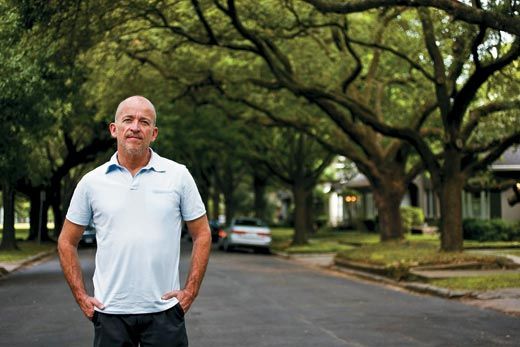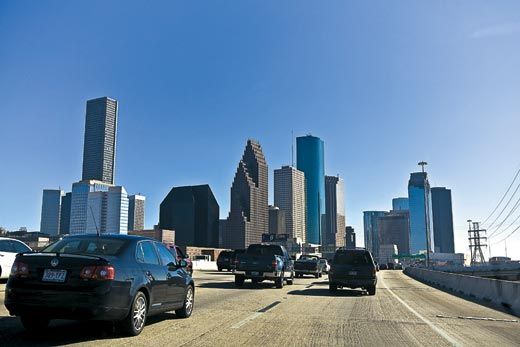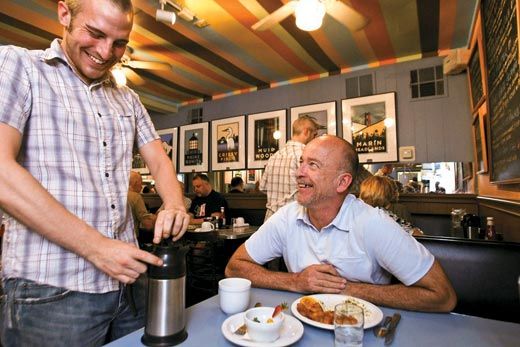Southern Comfort
Celebrated poet Mark Doty succumbs to Houston’s humid charms
/https://tf-cmsv2-smithsonianmag-media.s3.amazonaws.com/filer/mytown_houston_oct08_631.jpg)
It doesn't take long in Houston to realize that the beauty of the place is in the sky. The swamplands and fields that became the fourth-largest city in the country are almost entirely flat, and the availability of cheap land and an exuberant appetite for sprawl have kept most of the town low-slung and horizontal. So the sky seems vast, and from any parking lot you can watch big white towers of cloud sail up from the Gulf of Mexico 50 miles to the south as if they were navigating the ship channel beneath them. The expanse of sky is so wide, there's often more than one thing going on. Rain may darken the western rim while a fierce sun illuminates cloud towers in the center and a brilliant blue fills the east. How can you forecast the weather when it's doing three things at once?
I've only just started describing the place, and already I've had to employ a whole vocabulary of scale: largest, vast, big, wide. Indeed the sky's a huge, open relief from all the busyness below, but that cluttered landscape is itself immense. Houston's a universe of visual detail. Drive down the freeway (this is a city built on the premise of the personal vehicle, a private sphere to propel you through public spaces) and you become a reader of the telegraphic messages the city pulses out all day, all night: Bail Bonds, Paternity Tests, Taqueria, Weight Loss, Wireless, Margaritas, No Credit? Bad Credit?, God's Got a Plan for You, Gentlemen's Club, Nails, BBQ, Christian Singles. The city's welter of signs is a crazy patchwork of human desires given material form.
I've been coming to Houston for a decade now, teaching one semester each year in one of the country's best creative writing programs. I used to joke with my friends in the Northeast that every fall I descend into Texas like Persephone, only to return, come spring, into the light. But after a few years, my feelings about the place shifted. I can tell you everything that's wrong with it: no zoning, bad air quality, impossible climate. Tiny, malicious mosquitoes so tough and persistent you get bitten on Christmas Day. Poor drainage, so that the ubiquitous storms create floods of biblical proportion. It's harder to name just what it is about the place that's gotten under my skin, holds my attention here, makes me want to come back.
In spite of its international petroleum-based economy, its layered ribbons of freeways and corporate spires, Houston still feels Southern. Imagine a hybrid of New Orleans and Los Angeles, with a dash of Mexico City thrown in. True, it doesn't have the regional feel it once did, but you can still find it in my neighborhood, Montrose, an arts/alternative/liberal district near the center of town. Here the city's splendid tradition of patronage is on its best display, so the great old live oaks thrust their bowing branches out beside the Cy Twombly Gallery and the Rothko Chapel. The limbs dip perilously toward the ground, and the roots heave the sidewalks beneath them into little concrete alps, but since nobody walks anywhere it doesn't make much difference. In summer the trees resound with cicadas, like electronic versions of the Mormon Tabernacle Choir chorusing an insanely repetitive song. Gangs of bronzy black birds—boat-tailed grackles—prefer smaller trees in busier areas; they like grocery store parking lots and the drive-through lanes at the Taco Cabana, and they shriek and holler long into the night, as if in avian parallel to the traffic below. They're the loudest part of a plethora of urban wildlife: opossums, raccoons, the occasional snake slithering across the road, a sadly large population of stray dogs. Coyotes roam the cemetery north of Buffalo Bayou, where Howard Hughes is buried. All over town, tiny green lizards hold their heads up with notable alertness. My friend Mark's iguana, a giant version of those local denizens, escaped into a wisteria arbor and remained there for months before finally consenting to be lifted down.
Southern culture still lingers. There is, for instance, conversation with strangers. In my other life, in New York City, I'll walk into a deli and the guy behind the counter will shout, NEXT, and I shout back, COFFEE WITH MILK NO SUGAR. This brusque exchange is not rude, though visitors sometimes think otherwise; it is designed to make life easy for a large number of people, part of the unwritten civil contract that makes an enormous city work. If the server or I behaved this way in Houston, we would be seen as rude or crazy or both. Our exchange would more likely go something like this:
— How are you today?
— I'm doing well, thank you, and I sure am glad it's not as warm as it was.
— Oh, me too, I was just melting in that. Now what can I get for you?
I understand that this is simply social convention, so maybe I shouldn't find it so touching, but I do. When I first arrived, I went to a Whole Foods store in my new neighborhood to order some dinner from the deli there, and after I'd asked for some grilled chicken breasts the server said, "Would you like some green beans with that?" in a warm East Texas inflection, and I found myself tearing up then and there, almost unable to say yes. Hers was a version of the voice of my grandmother, who was from Tennessee and spent her life pleasing people with food. Would you like some green beans with that? meant I love you with all my heart, and what can I do to make you happy?
This particularly Southern social fabric, with its suggestion of a slower pace of life, no hurry in all the world, is eroding. That's not entirely a bad thing; in comes new energy, more urbane possibilities, new futures. Since Houston is about transformation, it seems by nature to be a city without much allegiance to history. If there were a motto on the town flag, I think it might read NO NOSTALGIA.
The city's a world capital of erasure. I'll often go away for a few days and return to find a familiar building gone. In fact, it's so common to drive down some street and find the built landscape changed that one loses the very habit of familiarity. I find it almost impossible, in a way that's not true of any place else I've lived, to remember what's gone. What stood on that corner last year? What was here before they built those new condos with the coffee/wine/tapas bar on the first floor? The past starts to seem irretrievable. There's a neighborhood near downtown called Freedmen's Town, for instance, that gained its name from a 19th-century community of former slaves. The streets were lined with small, orderly houses of the kind called "shotgun," one room opening into the next, so that if the front door were open you could see—or fire a shotgun—all the way out the back. These repositories of history are almost entirely gone now. In a flash, after decades in which the exurbs seemed to be most peoples' goal, it became fashionable to live downtown. So the old neighborhood disappears, to be replaced by something more anonymous, and while I tend to think the destruction of the past is regrettable, I admit I've had my preconceptions brought up short.
A friend asked a black student if he'd visited the city's historical African-American enclaves, and the student said, "Why would we want to see that?" That's a characteristically Houstonian attitude: What's so hot about yesterday? Let's go forward, let's see who we can be now. A historical preservation organization has been raising concerns that a handsome Art Deco theater in the city's River Oaks neighborhood will be torn down to build a high-rise. But I've come to understand the principle at work, if not its application: Houston is about the new, about transformation and ambition, the making and remaking of the self and the environment. Of course we make mistakes, but in ten years they're gone, and there's space for the next set of possibilities.
Whatever they are—our hopes, successes and mistakes—they're put in perspective by what Shakespeare called "this brave o'erhanging firmament." When the clouds conjoin and a storm pushes up from the Gulf, look out. I've seen a tornadic tropic fury pour in, tingeing the day an evil green, and the whole city suddenly resembles some underwater kingdom. Wiser drivers pull over and wait for the storm to pass. The foolhardy plunge forward, plowing through channels of rainwater filling the intersections. Sometimes whole school buses float away. Everyone hopes for reprieve. Which won't be long in coming, so that we can forget about the sky and return to the theater of our aspirations, the daily traffic, this new city's strange promises and invitations.
Mark Doty's most recent books include Fire to Fire: New and Selected Poems and his memoir Dog Years. In November 2008, Doty received the National Book Award for poetry for Fire to Fire.
Planning Your Next Trip?
Explore great travel deals
Smithsonian magazine participates in affiliate link advertising programs. If you purchase an item through these links, we receive a commission.


